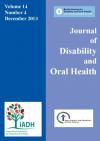Journal of Disability and Oral Health

- Cover Date:
- December 2013
- Print ISSN:
- 1470-8558
- Vol:
- 14
- Issue:
- 4
A feasibility study of the use of oral screens in reducing saliva loss in young people with physical and intellectual impairments
Abstract Purpose: Approaches to improve saliva control can be behavioural, pharmacological or surgical. This study reports on the use of oral screens to reduce drooling in children with oromotor difficulties. Methods: Five participants were assessed by a speech-language therapist and a special care dentist and enrolled in an oral screen programme. Oromotor function and drooling were rated at baseline, following intervention and after a no-treatment phase. Results: All participants reported improvements in oromotor function and sensation, eating behaviours and drooling. Two had initial difficulty accepting the oral screen and one reported increased drooling. By the end of the first intervention cycle, all participants tolerated the screens. Conclusions: The small number of participants limits the reliability of findings. Nonetheless, the assessment results and the encouraging subjective reports of improved saliva control and impact on family life, suggest further investigation of this management approach is warranted.
Key words: Oral motor function, drooling, oral screen
Doi: 10.4483/JDOH_28Smith08
- Article Price
- £15.00
- Institution Article Price
- £
- Page Start
- 145
- Page End
- 152
- Authors
- Martine Smith, June Nunn, Trish Morrison
Articles from this issue
- Title
- Pg. Start
- Pg. End
- A report on a pilot aimed at improving the oral health of older people within a hospital setting
- 123
- 134
- Oral health status and oral health related quality of life in patients with congenital bleeding disorders
- 135
- 144
- A feasibility study of the use of oral screens in reducing saliva loss in young people with physical and intellectual impairments
- 145
- 152
